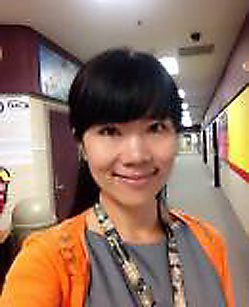Year two of Mandarin Chinese Immersion Program begins in Naselle
Published 11:46 am Tuesday, November 4, 2014

- Xie Fen
NASELLE — A Mandarin Chinese immersion program successfully launched at Naselle-Grays River School District for kindergarten and first grade students last year is expanding to include second grade.
The expansion comes after the Naselle School Board voted in May to provide up to $25,000 to continue the immersion program this school year. Helping pay for this are grants from the College Board and the Teachers of Critical Language Program.
The two new Mandarin teachers arrived shortly before the start of this school year. With two months of teaching at Naselle, it’s time to get to know them and their perceptions of their host community.
Ms. Xie Fen, 1st grade Mandarin immersion teacher
Xie Fen (pronounced “She Fong”), or Michelle as she is called at the Naselle school, was born and raised in Hunan province in southern China. As is the case in much of China, she comes from a small family made up of her parents, now retired, and her brother. She lives in the neighboring province of Guangdong, formerly known as Canton. Now single, she has a 13-year-old son, Wang, Yifeng (Andrew) who is currently in the 7th grade in China and lives with his father. According to Xie, “He is a handsome and cute boy and I love him very much.” Knowing she would be away from her son for up to a year made coming to the U.S. a very difficult decision, but she felt the experience would make her an even better teacher upon her return to China.
Xie has a bachelor of arts degree in English from Xiangtan University in Hunan province. She has been teaching at the Guangdong Country Garden School since 1997 and has received a number of awards for her competence as a teacher. The school is a member of the International Baccalaureate Organization. IBO, headquartered in Geneva, Switzerland, offers high-quality education and assessment programs and is currently serving more than 750,000 students at 2,749 schools in 138 countries on all six inhabited continents. An International Baccalaureate diploma is an internationally recognized standard of academic excellence. Xie says she is highly committed to IB education. At her school in Guangdong, she is the Primary Years Program coordinator and the senior teacher at the primary level. In 2013, Xie was selected to be the IB PYP workshop leader and the school’s visiting member. Recently, she was selected to lead an IB PYP workshop in Los Angeles, scheduled for January 2015.
Xie was raised in a town that she describes as being very similar to Naselle. “It’s a small town where we can see the hills, mountains, rivers and the people are very nice to each other. The main industry there is logging, farming and fruit orchards. I find the people of Naselle are also very friendly and warm-hearted.”
Xie describes her students at Naselle as “lovely. … I really enjoy my time with the kids. I think being with them makes me feel young. They are learning very fast, especially the kids in kindergarten.” Xie teaches the first grade immersion class for half a day, and she and the second grade immersion teacher, Chen Sha, work as a team during the other half of the day teaching the kindergarten immersion class.
The kids are not the only ones learning in Xie’s class. She says, “One thing that is quite challenging for me is teaching the children mathematics in Mandarin because I have never taught math before, not even in China.
Xie, a very likable and outgoing young woman, arrived in the U.S. for the very first time in August and has already purchased a used car which she uses on weekends to explore the local area. So far, she says she has been to Portland, Longview, Long Beach, Astoria and Cannon Beach. When asked about her interests, Xie responded that she enjoys music, books, sports and traveling.
Xie comes to Naselle through the Teachers of Critical Languages Program (TCLP), a program of the Bureau of Educational and Cultural Affairs of the U.S. Department of State. According to their website, TCLP is designed to increase the study and acquisition of important world languages in U.S. schools. This program enables primary and secondary schools to strengthen their teaching of Mandarin and Arabic by bringing Chinese and Egyptian teachers to the U.S. to teach their native languages and culture for an academic year. The exchange teachers receive ongoing methodological observation and training opportunities, live and work in an immersive English environment, and receive a certificate of participation following their exchange.
Xie hopes to develop long-lasting ties between her home school and her U.S. host school in Naselle.
Ms. Chen Sha, 2nd grade Mandarin immersion teacher
Chen Sha (pronounced “Chong Shaw”), known as “Shasha,” is from Sichuan Province in the southwest of China, a province that shares a common border with Tibet. Chen’s hometown of Xichang is “a little bit bigger than Naselle.” Her father works in the construction industry and her mother has a shop for making and selling children’s clothing. She has an older sister, now married, and a younger brother currently in the 7th grade.
Chen attended Huagiao University in Fujian Province in the southeast of China, a mountainous area located on the coast of the strait of Taiwan. She received a bachelor of arts in teaching Chinese as a second language. Upon graduation, she taught Chinese for four years in Thailand. She is trilingual, learning English in middle and high school and Thai at the university.
Like Xie, this is Chen’s first trip to the U.S., arriving in early July. She says, “I enjoy it here. It’s a good place. It’s quiet and far from the city so you can enjoy the country life. I am kind of from the country so I like that. The people in Naselle and the other teachers and administrators here at the school are very kind and considerate. I am very fond of my host family.”
Chen is single and, on first impression, appears to be shy. But it doesn’t take long to realize she is more contemplative than shy and is a young woman with an adventurous spirit. She enjoys being able to travel and teach in new countries and become immersed in their cultures. Chen has purchased a used car and is currently working toward getting her driver’s license. At this point, she has taken and passed the written test, giving her a driving permit. With the help of her host family, she is now practicing the actual driving of her car. Her goal is to be able to drive around on her own and explore the local area.
Speaking about her students at Naselle, Chen says, “They have great curiosity and want to learn everything. Sometimes, we don’t have the energy or the time to do all they want. We teach them math, social studies, culture and, of course, Chinese.”
Chen is in the Chinese Guest Teacher Program of the College Board, the same College Board that is known for its SAT test. According to their website, the program is designed to develop Chinese language and culture study programs and to promote international exchange between the United States and China. The program is made possible through a collaboration between the College Board and HanBan/Confucius Institute Headquarters (Hanban). The program has grown to be the largest Chinese visiting teacher program in the U.S. Each year the program serves hundreds of K-12 schools and districts nationwide and reaches tens of thousands of students. The guest teachers have at least three years of teaching experience and have gone through a rigorous selection and training process before arriving at their host schools. The host school is responsible for providing a partial salary to the guest teacher and the remainder is subsidized by a stipend from Hanban.
Lisa Bartel, local veterinarian and mother of 2nd grade Mandarin student Aliya, is impressed with both of the new teachers, saying, “They are different people than last year’s teachers, Lin Li and Xiao Qian, with different personalities and different styles of interacting with the kids, but that is a good thing. They bring different perspectives to the kids and that’s good for them. It’s just like here in the United States, we have different cultures in different parts of the country with different ways of expressing ourselves. Shasha and Michelle come from different areas in China. In my view, that helps to broaden the experience for our children. Aliya just loves the program.”
Kindergarten students Shaylee Suomela and Haley Edwards said they really like being in the Chinese class and are learning lots of Chinese words and about China. Both girls report they want to continue in the Chinese class when they are in the first grade.
By its own mandate, the school board has until April 15, 2015 to determine whether funding is available for the program to continue in the 2015-16 school year. Parents and other members of the community have recently created an organization called Liu Xing (Rising Star) that is dedicated to building the sustainability of the Mandarin Immersion Program.





